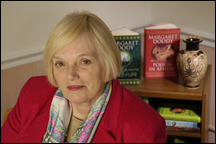
The words of ancient philosophers such as Aristotle have been handed down through the generations. But to get a feel for what life was like thenin essentially the early days of academiathere are few better sources than the novels of Notre Dames Margaret Doody, John and Barbara Glynn Family Professor in Literature and director of the Universitys Ph.D. in Literature Program.
Doody is the acclaimed author of a series of mystery novels set in ancientGreecefeaturing Aristotle as a sandal-wearing Sherlock Holmes; each is based on one of the philosophers major texts.
A renowned scholar of 18 th century literature and the history of the novel, Doody is influenced by such authors as Jane Austen, Charles Dickens and Walter Scott. But she has also always loved detective novels.
In a serendipitous moment in the late 1970sshe had been rereading AristotlesRhetoricthen went to bed with a detective storyshe realized that the great philosopher also was a natural detective, equipped with a keen sense ofthe evils of human nature.In writing the first Aristotle novel,Aristotle Detective,Doodys motivation was simple:If I dont do this, no one will.
A friend urged her to enter her manuscript into a historical novel contest.She placed second, but the unique intertwining of detective novel and ancient history captured the interest of English publisher Bodley Head and Harper&Row in theUnited States.
In the more than 20 years since, the fate of the series has undergone more plot twists than the novels themselves. First, her luck turned as her publishing house closed and her editor retired, just as she had finished the second novel,Aristotle and Poetic Justice.In the late 1990s, an Italian journalist stumbled across a copy of the abridgedAristotle Detectiveand convinced Sellerio, a publisher based inPalermo, to publish an uncut translation of the intriguing book.In 1999, the new version was published to rave reviews.
Aristotle and Poetic Justiceand the subsequentAristotle and the Mystery of Life,andPoison in Athensare published in Canada and England by Random House; in Europe, the Italians remain her greatest fans, although the stories are translated in French, Portuguese, Greek and, soon, Turkish and Polish. Having recently engaged aU.S.literary agent, Doody is optimistic that the series soon will be available in this country.
While she would be comfortable being seen as a writer of detective or mystery stories, she says,I think of myself as a writer.Indeed, her life as a novelist has coincided with a distinguished and prolific career as a scholar.Concurrent with her adventures with theAristotleseries, she wroteThe True Story of the Novel,a 1996 National Book Critics Circle Award finalist. The book reveals Doodys considerable sleuthing skills as she proposes that what is understood about the origins of the novel overlooks a genre that began in ancient times and flourished across cultures.
Her scholarly writing and her novel writing aresupplementary and complementaryto one another, she says. As she plans the sixth Aristotle mystery (the fifth is complete,) and mentors scholars through the Ph.D. in Literature Program, Doody also has been commissioned to write a non-fiction book aboutVenice.
TopicID: 10282